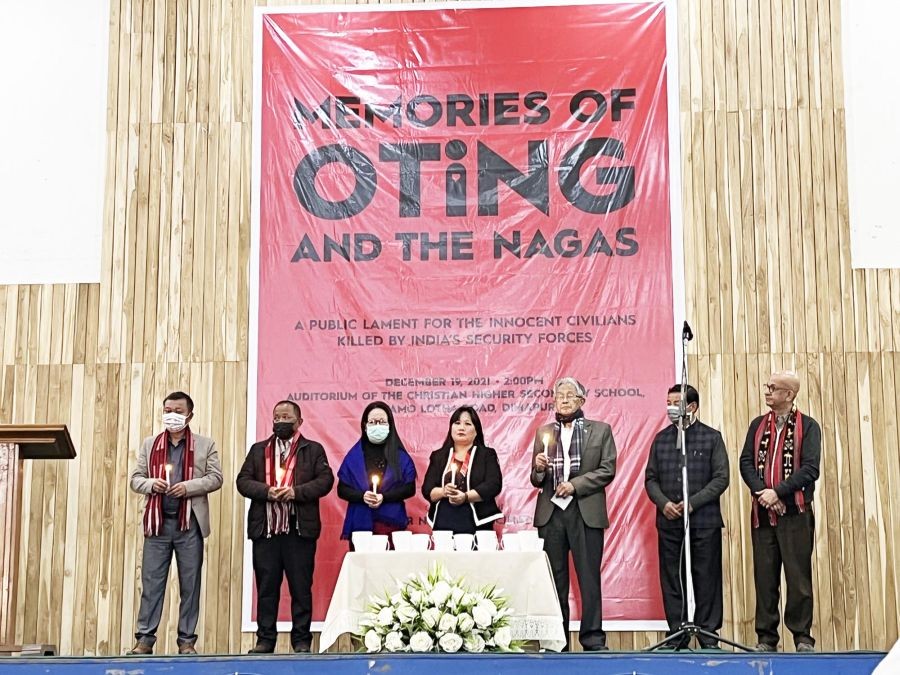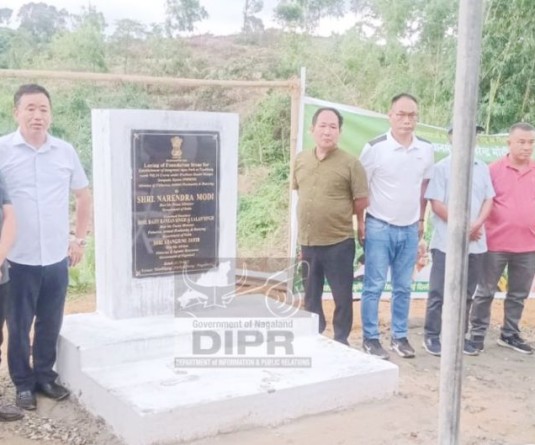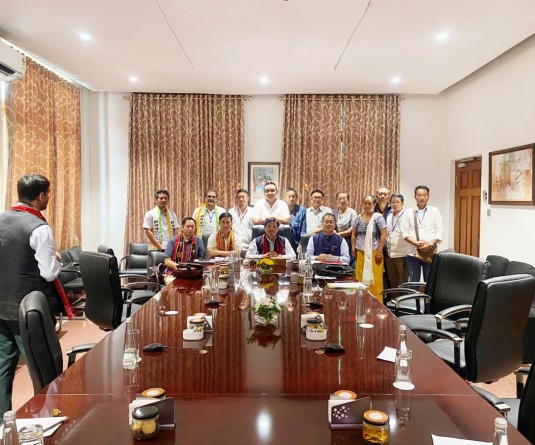A total of 14 candles were lit in memory of the 14 innocent civilians who were killed by Indian security forces in Oting and Mon town, during the ‘Memories of Oting and the Nagas,’ programme on December 19. (Morung Photo)

Morung Express News
Dimapur | December 19
The crime committed by the Indian security forces at Oting is horrifying and dreadful, the wounds and pains can never be forgotten, yet the tragedy, in a mysterious way, has united all the Naga tribes. This was the central message expounded by several speakers during the ‘Memories of Oting and the Nagas,’ programme organised by the Forum for Naga reconciliation (FNR) on December 19.
Members of the Naga society came together at the Christian Higher Secondary School Auditorium, Dimapur to stand in absolute solidarity with Oting Village and the Konyak Naga People, and protest the “absolute disregard for the right to life and personal liberty displayed in Oting.”
While outrage over the killings were categorically expressed, the consciousness that such incidences are sustained by a culture of impunity that originates from the Armed Forces (Special Powers) Act were also underscored by several speakers.
Among them, Dr Visier Sanyu, a member of the Forum for Naga Reconciliation (FNR) which organised the event, stated that the innocent young men of Oting “did not die in a battlefield but it is as if they laid down their lives so that the Naga people could be united and find our destiny by learning to be in peace.” He also emphasised that the public were gathered not to seek revenge but to seek justice with hope, peace and love.
The civilians in Oting were killed because they were Nagas, not ‘insurgents or terrorists,’ he pointed out, adding: “They were killed simply because the Indian Army could do so with impunity and without legal consequences.”
Oting has awakened us, he said while putting across that it was a time for the Naga people across all borders to discern, reflect and correct themselves in the joint search for integrity and honesty. He also cautioned against politicising the Oting ‘massacres’ for one’s own advantage.
While mourning those who were killed by the Indian Army over the years, Dr Sanyu also drew attention to the numerous fratricides in the Naga society and stated that “some of those who had killed their own Naga brothers are trying to shift the focus to a common enemy.”
We cannot do this, he asserted, adding that it would be a sign of weakness and a lack of integrity to do so. “Oting, with a difference, should help us tell the ugly truth, to politicise it would be morally wrong and we would betray the dead and the living,” he maintained. He also acknowledged the death of the jawan who was killed and whose name has not been released.
Repeal of AFSPA a priority
The demands for the repeal of the contentious Armed Forces (Special Powers) Act, 1958 were unanimous as speakers including Dr Sanyu, who pointed out that tragedies like Oting were resultant of the Act that detracts from common humanity. “In seeking justice we need to recognise the unjust laws that undermine our human rights, the recognition of the inhuman justice inherent in AFSPA, is the overriding starting point. Repeal of AFSPA is the priority as this inhuman law detracts from common humanity. This is more painfully clear than ever before at this juncture in our history,” Dr Sanyu maintained.
The Oting massacre, he said, demonstrates once again the vulnerability of a fragile and small group desperately seeking to survive as peoples. “India is determined to protect her territorial integrity against the threat of China and is using any means to keep the Nagas and the North-East in check,” he maintained.
Similarly, Dr Aküm Longchari who was part of the FNR Team that visited Oting and Mon earlier in the week, said that the accounts of survivors and the people of Oting, the spot report of the Director General of Police and the Home Commissioner of the Government of Nagaland “indicate that there was absolute disregard for the right to life and personal liberty.”
Stating that it was a blatant display of force and the unjustifiable abuse of power, Dr Longchari also referred to the suo moto FIR against the 21st Para Special Force of the Indian Army by the Tizit Police Station.
While the people are awaiting the Government of Nagaland’s Special Investigation Team to complete their investigation and make public their findings, Dr Longchari underscored the need to tell and hear the stories from Oting and Mon. The corridors of authority and the powers that be are spinning their own narratives on the sequence of events, and as such “The stories of Oting need to be told so that no matter how the powers try to change the narrative, the lived experiences and accounts of the survivors become our living memories,” he maintained.
Highlighting the history of the AFSPA and how it came to force, Dr Longchari also emphasised that “In its 63 years, the AFSPA has not achieved its purpose and in our Naga experience, the AFSPA is not only a colonial act, but has proven to be anti-peace.”
Not only has AFSPA weakened India’s democratic framework, but it has proven to be counter-intuitive to human values and the sacredness of human life, he asserted.
“While we recognize that AFSPA is only a symptom of a deeper political question, Oting reminds us that the AFSPA has no place in our contemporary world of the 21st century, and must be repealed. It will require strong moral and political leadership and an unrelenting strategic nonviolent peoples’ movement to ensure there are no more incidents like Oting,” he added.
Further, Dr Longchari underscored that the “Nagas do not want peace that is imposed from above, but we want an inclusive peace that emerges from the ground-up based on justice which recognizes our rights to chart our own destiny.”
He also asked the Naga people to reflect on what Oting meant to them, and opined that it was “time for Nagas to awaken and reach out to one another, to stand in solidarity, to humble ourselves and learn to be united in purpose.”
Stating that the tragedies in Oting and Mon have occurred at a time when Nagas are encircled in darkness, he posed: “Can Oting be the light in the hill in this time of darkness? Can the Konyaks be the light in the hill for the Nagas, and can the Nagas be the light in the hill for the world?”
Meanwhile, Dr Longchari also reflected on the FNR team’s interaction with Konyak organisations and leaders and acknowledged the Konyak leaders, who in the face of a storm remained calm and unwavering, demonstrated dignity and were united in resolve.
The gathering also witnessed sharing of experiences from ‘ground Zero’ by survivors James Konyak and Nyawang Wangsha from Oting village. Rev Peihwang Wangsa from the Konyak Baptist Bemeinok Bangjum and Eastern Nagaland Women Organisation (Dimapur Unit) President N Langmei Phom also shared messages of solidarity with the victims and their families and called on the Naga people to unite and reconcile, not only in words but also in action so that justice is served and the future is protected.
GoI must act responsibly to ensure justice, insists ‘Public Declaration on Oting Massacre’
Morung Express News
Dimapur | December 19
The Forum for Naga Reconciliation with the support of 26 Naga organisations made a public declaration on December 19 calling on the Government of India (GoI) to act responsibly to ensure justice for the victims of Oting and Mon killings.
“We, the Public have come together under the theme Memories of Oting and the Nagas organised by the Forum for Naga Reconciliation on December 19, 2021 to stand in absolute solidarity with Oting Village and the Konyak Naga People,” the declaration stated.
In the declaration read out by FNR Convenor Rev Dr Wati Aier during a programme at the Christian Higher Secondary School Auditorium, Dimapur, the public expressed outrage at the “obvious intention of the senseless and arbitrary killings of innocent Naga civilians committed by India’s 21st Para Special Forces Regiment.”
“Considering this violation of the right to life constitutes the gravest infringement of human dignity and human worth, we insist the Government of India to act responsibly by immediately removing and repealing the Armed Forces Special Powers Act of 1958, ensuring justice for the victims of Oting and Mon killings,” the declaration stated.
It called on the GoI to initiate appropriate disciplinary action against the Commanding Officer and personnel of the 21st Para Special Forces Regiment involved in the killings of 13 civilians and injuring at least 14 civilians in Oting on December 4, according to the rule of law, as well as disciplinary action against the Commanding Officer and personnel of the 27th Assam Rifles involved in the shooting that killed 1 civilian and injured at least 18 civilians in Mon Town on December 5.
An opportunity to self-reflect
The declaration stated that the tragedies in Oting and Mon present an opportunity for Nagas to self-reflect and discern together “so that our present crisis can be publicly redressed.”
In this regard, it implored the Naga Political Groups to shed their differences and take positive steps to reconcile, unite in purpose and cooperate in the common interest of the shared Naga historical and political rights.
It also asserted that it was a time for “All Naga leaders – overground and underground – to rise above party politics and self-interests by demonstrating statesmanship and healing leadership using nonviolent means,” and for the Naga public to hold their leaders and themselves accountable, and resist all forms of tribalism and other forms of isms which divide the Nagas.





